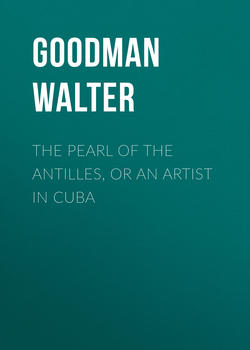The Pearl of the Antilles, or An Artist in Cuba

Реклама. ООО «ЛитРес», ИНН: 7719571260.
Оглавление
Goodman Walter. The Pearl of the Antilles, or An Artist in Cuba
PREFACE
CHAPTER I. A CUBAN WELCOME
CHAPTER II. DAILY LIFE IN CUBA
CHAPTER III. ART-PATRONAGE IN CUBA
CHAPTER IV. A CUBAN 'VELORIO.'
CHAPTER V. CUBAN MODELS
CHAPTER VI. CUBAN BEGGARS
CHAPTER VII. THE BLACK ART IN CUBA
CHAPTER VIII. A TASTE OF CUBAN PRISON-LIFE
CHAPTER IX. A WEST INDIAN EPIDEMIC
CHAPTER X. GENERAL TACON'S JUDGMENT
CHAPTER XI (VERY) HIGH ART IN CUBA
CHAPTER XII. A CORRESPONDENT IN THE WEST INDIES
CHAPTER XIII. CUBAN MUSIC
CHAPTER XIV. MASQUERADING IN CUBA
CHAPTER XV. AN EVENING AT THE RETRETA
CHAPTER XVI. AT A CUBAN BALL
CHAPTER XVII. CUBAN THEATRICALS
CHAPTER XVIII. MY DÉBUT ON A CUBAN STAGE
CHAPTER XIX. COFFEE GROUNDS OF CUBA
CHAPTER XX. COUNTRY LIFE AT A SUGAR ESTATE
CHAPTER XXI. LOVE-MAKING IN THE TROPICS
CHAPTER XXII. A CUBAN CONVENT
CHAPTER XXIII. A CRUISE IN THE WEST INDIES
CHAPTER XXIV. A STATE OF SIEGE IN CUBA
CHAPTER XXV. CUBAN WARFARE
CHAPTER XXVI. HAVANA CIGARETTES
CHAPTER XXVII. A MULATTO GIRL
CHAPTER XXVIII. A MULATTO GIRL (continued)
CHAPTER XXIX. A CUBAN WEDDING
CHAPTER XXX. CUBANS IN NEW YORK
Отрывок из книги
My companion and brother-artist, Nicasio Rodriguez y Boldú, is a native of Cuba, and as he has signified his intention to visit his birthplace in the West Indies, we bid 'addio' to fair Florence, where for three years we have dwelt together and followed our profession, and, embarking in a French steamer at St. Nazaire, we set sail for the Pearl of the Antilles.
Our official reception at Santiago de Cuba is far from cordial. Before we land, the Spanish authorities meet us on board, and, after a careful inspection of our passports, present each of us with what they call a 'permit of disembarcation,' for which we have to pay sixteen reales 'fuertes.' Having, so to speak, purchased 'tickets of admission' to the Spanish colony, and having also deposited our luggage in the 'cloak-room' of the establishment – which in this instance is represented by a custom-house – we naturally expect to be favoured with a 'bill' of tropical performances. No such bill is, however, presented to us; but as a substitute, we obtain full particulars by application, within a month after our arrival, to the chief of police. From this functionary we learn that our 'tickets of admission' are available only for one quarter's sojourn in the island, and that if we desire to remain for a longer period, an official 'season-ticket' must be procured. The authorised programme of the 'Loyal and Ever-faithful Isle' is divided into a great many Acts. One of these acts announces that 'no foreigner is allowed to reside more than three months in the island without procuring first a carta de domicilio (habitation license), which he may obtain by a petition supported by the consul of his nation.' The carta de domicilio will enable the foreigner in question to dwell unmolested in this strangely governed country for a period not exceeding five years; but he may not leave the island, neither may he remove to another town, without a pass from a Capitan de Partido, a Celador, or some such official.
.....
Crowds of beggars are assembled within range of the plaza, and some of them occasionally invest in a medio or peseta's worth of tickets, but as coloured people are never permitted to mix with white folk in public, their tickets are handed to them by officials appointed for that purpose. Some of these blacks are 'retired' slaves: in other words, negroes who have become free, either by devoting the savings of many years to the purchase of their liberty, or by having their freedom left them as a legacy by an indulgent master. Those who have ability and industry make the most of their precious gifts by devoting their energies to trade or to music, for which accomplishment negroes have often a natural inclination; but the infirm or the inactive – and of these there is always a majority – are reduced to penury, in which condition they fall naturally into begging ways, and prosper accordingly.
That intelligent-looking black who craves of me a peseta in order to buy a small bundle of tickets for the raffle, is a well-known beggar. His name is Roblejo, and he owes his freedom to the publication of a book of poems written by himself. Assisted by a benevolent littérateur, Roblejo was enabled to put his poetic lucubrations into readable form, and the novelty taking the public fancy, subscribers were found sufficient for the purpose of printing the book, and effecting the author's emancipation.
.....